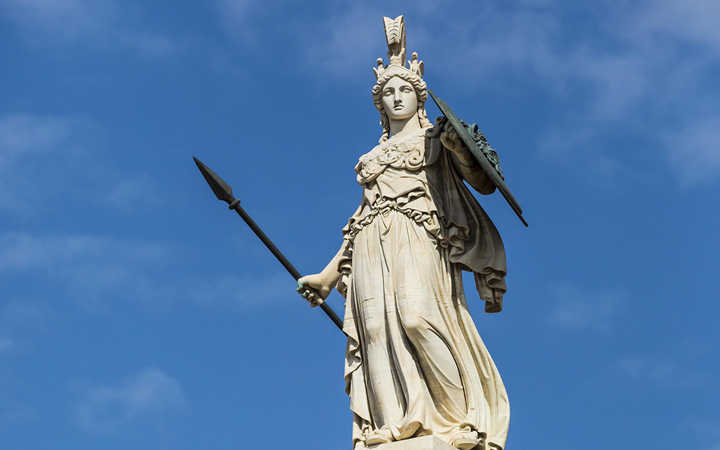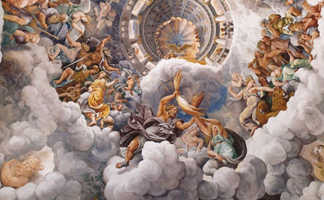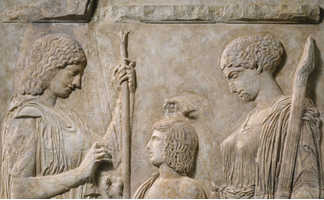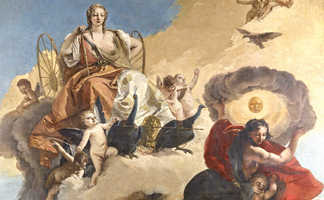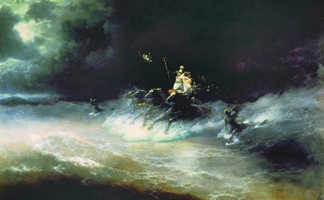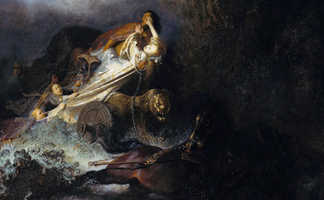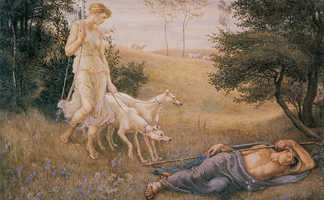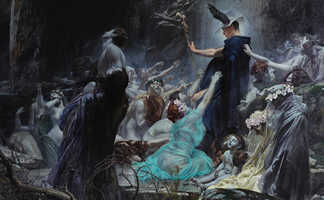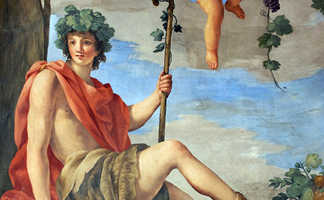Athena was perhaps the most accomplished of all the Olympians. Favorite of her father, Zeus, Athena was a skilled fighter, an aid to many in both a practical and advisory capacity, was the patron of handicrafts- especially spinning and weaving- and was the most resourceful and most courageous of the Twelve.
In present day Greece, Athena is one of the most popular girl’s names.
Origins
In the origin story of Athena we have another example of that habit peculiar to the Greek pantheon: the swallowing whole newly born offspring. Cronus did it to the five of the Big Six of the most important of the twelve: the three sisters Hera, Hestia and Demeter, and two of the three brothers Poseidon and Hades, with the third brother, Zeus, rescuing the other five from the his belly.
I’m sure this phenomenon has been thoroughly researched by people smarter than I, and that there is a suitable and satisfactory psychological reason for this kind of behavior buried deep in the psyche of the noble Greek. It’s not cannibalism, is it? They’re being swallowed whole, enabling them to dwell in dad’s belly, awaiting the emetic young Zeus would eventually administer, thus delivering his siblings.
In this second case, you have Zeus one-upping old dad by a sort of two for one deal, swallowing the Titan goddess of wisdom and consul, Métis, his first wife, who was pregnant with Zeus’ child. He was following the advice of Gaia, the Earth, and Ouranos, Heaven, who counseled that in this way no one would usurp him. In other words, his motive was the same as Cronus’, who also brooked no rivals.
There is a second, more popular origin story for Athena, and this one has her the product of no mother at all. Only Zeus begot her. In both cases the birth of Athena is the same, and quite dramatic: she springs, fully formed, wearing armor, from the forehead of Zeus. The myth goes that sometime after swallowing the pregnant Mets, Zeus began to suffer terrible headaches, and ordered Hephaestus to open his forehead with an axe, thus mid-wifing Athena.
In addition to armor, Athena was wearing an aegis, which is an animal skin or shield, depending on the myth, and was carrying a lance. This is how one recognizes her in depictions. The aegis was only worn by Zeus and Athena. I like the shield version of the aegis, as it is emblazoned with the likeness of Medusa, who could turn anyone who gazed at her into stone, and the shield/aegis could do likewise. Her unique attributes, and the unusual manner of her birth, sets Athena apart from all of the other Olympians.
Since Athena is associated with the protection of cities, most notably Athens, she is considered a civilized goddess. Have you ever wondered why Athens is called Athens, which is a plural form, and not Athena? It’s because Athens is an amalgam of a number of demoi, which were previously independent districts. Each demos adopted Athena as their patroness, and when they consolidated, the resulting city was named Athens, or, in the Greek plural form, Athanaι.
You’ll often see her referred to as “Pallas Athena.” So what’s that all about? There are differing accounts as to the meaning of Pallas. Some say that the etymology of the word “Pallas” is from an old root word meaning “young woman.” Another version claims that “Pallas” is the eventual form of a word that had been handed down orally for centuries, before it was codified in writing, which originally comes from “Polis-” city. A third version has Pallas as Athena’s best friend who was turned to stone by Zeus, who wielded the Gorgon aegis (which originally belonged to him, or he lent it to Athena regularly), while the Pallas and Athena were practicing hand to hand combat and it looked as if Pallas would seriously wound Athena. Heartbroken at the loss of her friend, Athena added Pallas’ name to her own. Athena is also known as the “Parthenos” or the Virgin, which is where the Parthenon got its name.
Warrior
In the Iliad, you see Zeus allotting all things pertaining to war to Ares and to Athena. Athena’s role in war is seen as superior to that of Ares, however, in that Ares’ contribution to warfare is chiefly in the frenzy associated with killing. Athena, however, elevates the concept of war beyond simple bloodlust to the application of certain ideals such as heroism, the nobility of sacrificing one’s life for one’s homeland, glory, and skill in close combat. These attributes contribute to the honor and respect accorded by a society towards its warrior class.
War to Athena is a battle of wits as well as of strength, and the best strategist wins. She was not above stacking the deck against her opponent, embodying the old “all is fair in love and war” maxim. For example, during the single combat between Achilles and Hector, she took on the shape of Hector’s brother, luring him closer to Achilles and making him easier for Achilles to dispatch. On the other side of the warfare coin, Athena is also known as a peacemaker.
Wise Counselor, Helper in Handicrafts and the Arts
The owl, a figure of wisdom from antiquity, is Athena’s most common symbol. She was known to aid various Greek heroes with her wise counsel on their quests. She gave Perseus a mirrored shield to defeat Medusa. She advised Jason to build a ship and go on his quest for the Golden Fleece. She advised and assisted Odysseus, often wearing disguises or shifting her shape, on his journey home from the Trojan war. After actively helping the Greek forces in the Trojan War, she played an outsized role in the Odyssey, where she is mentioned 162 times, helping to shepherd Odysseus safely home. She aided Heracles in some of his twelve labors. She gave Bellarophon a golden bridle to tame Pegasus
Athena is credited with teaching men how to yoke oxen and plow. She was also the goddess of skilled labor and handicrafts, and particularly known as the patroness of spinning and weaving. She gave constant inspiration to the inventor and craftsman Daedalus, fabricator of the wax wings with which his son Icarus flew too close to the sun.
But Don’t Cross Her
Like almost all the other Olympians, Athena had her moments of anger. She punished Iodama, a princess of Thessaly, for impiety at Athena’s temple by turning her into stone with the use of Medusa’s head, which she had hidden in her garments. She blinded Ilos, a king of Troy, for destroying her shrine. She punished Alikone, who failed to pay a weaver who had done some work for her, by causing her to be unfaithful to her husband.
She punished Laocoön, a priest of Poseidon (remember that Athena and Poseidon were enemies), for suggesting the Trojan horse (Athena’s brainchild) might be a trick, and advocating that it be burned. She sent sea serpents to devour the priest and his sons. This event is memorialized in an incredibly dramatic ancient sculpture dating probably from the first century, AD, which can be found in the Vatican Museums.
She lost a weaving contest with Arachne, and turned her into a spider out of spite. “Arachne” continues to be the name for “spider” in Greek, with “arachnophobia” being the psychological term for an irrational fear of spiders.
Athena vs. Poseidon
The best-known myth concerning Athena involves her vying with Poseidon for the privilege of being the patron deity on Athens. This is the same story we’ve covered in the article on Poseidon, so if you’ve read that one, you might want to skip it. One the other hand, if you want to refresh your memory, read on, dear reader, read on.
Poseidon and Athena both desired to be the patron of Athens. Apparently the Olympians did a fair amount of this sort of thing; vying with one another to be the patron of a city or region.
Zeus decreed a contest between the two deities, which took place on the Acropolis: each was to offer the city a gift. Athena gave the city the olive tree. Poseidon struck the rock of the Acropolis with his trident and brought forth seawater. Obviously Athena would win this contest hands down. One version of the story goes that Poseidon, undeterred, figured he’d try again and get it right this time. And he did. He struck the earth and out of sprung, fully formed, the world’s first horse, with a wavy mane resembling the sea. This proved his ingeniousness as a creator, and explains why he is often portrayed as driving a chariot over land, or a chariot being drawn by seahorses over the ocean.
At any rate, this didn’t change anything. Athena was still the winner of the contest. She became the patroness of Athens, which named itself after her, and earned her the permanent enmity of Poseidon. From that time they were forever in conflict. During the Trojan war, for example, Poseidon sided with the Achaeans (Greeks) and Athena took the side of the Trojans.
Athena is perhaps the most fully-formed personality of the Olympian gods. Rather than being a collection of superhuman attributes, she is complex, talented, multi-faceted. She avoided all contact with men, and exhibits in almost equal measure both feminine and masculine attributes.

